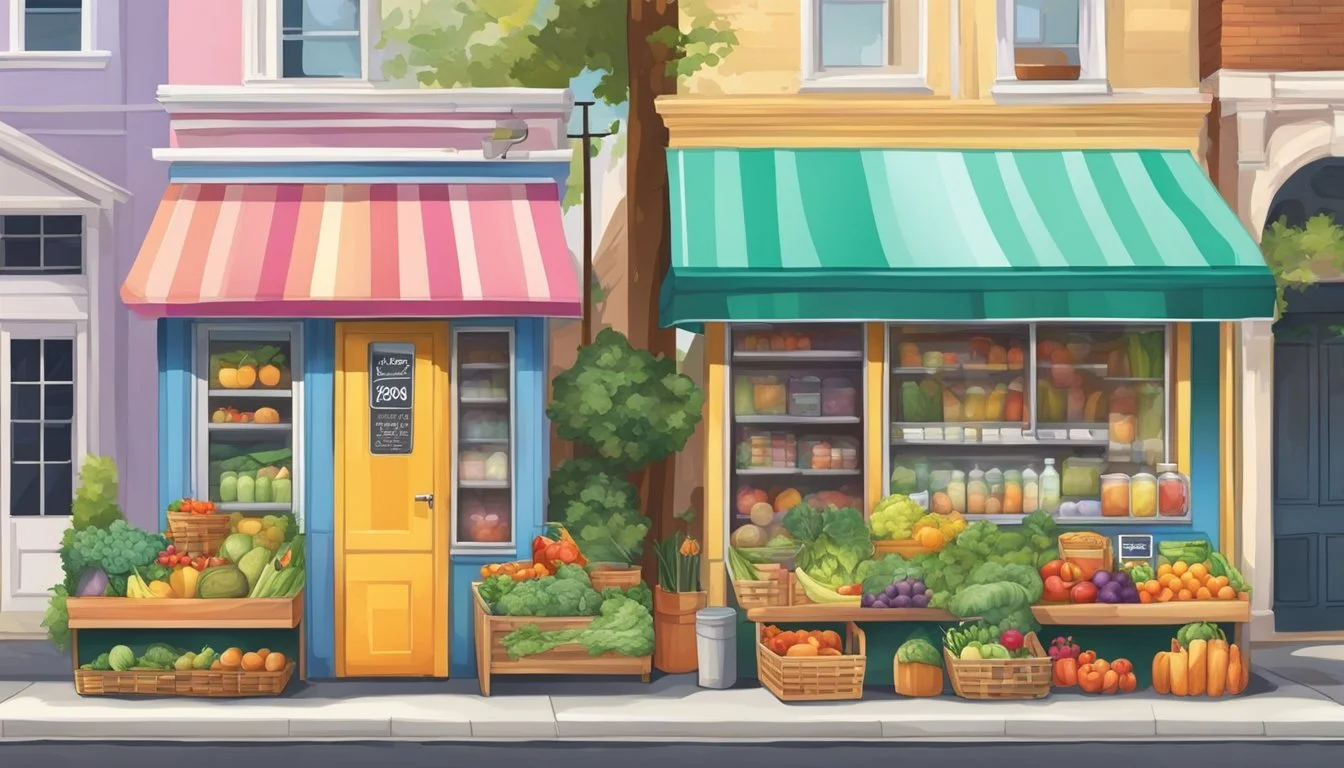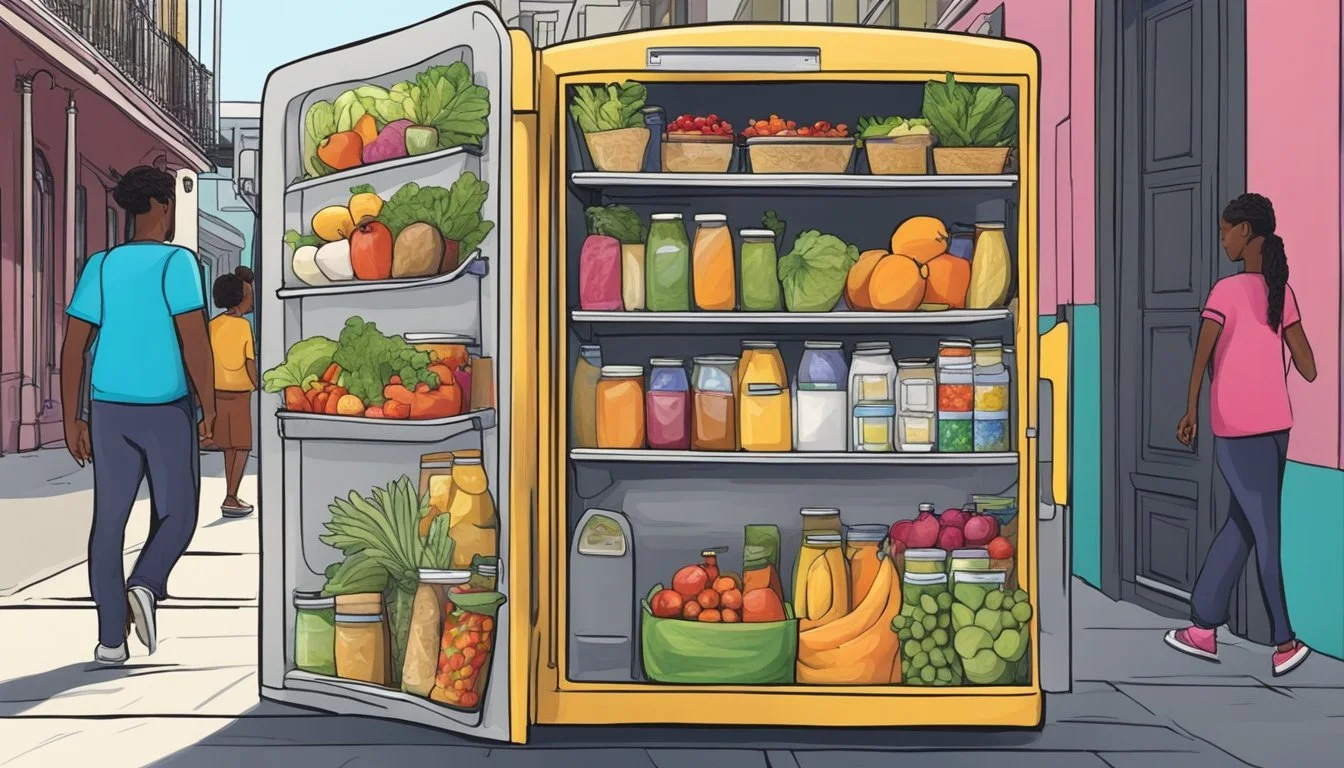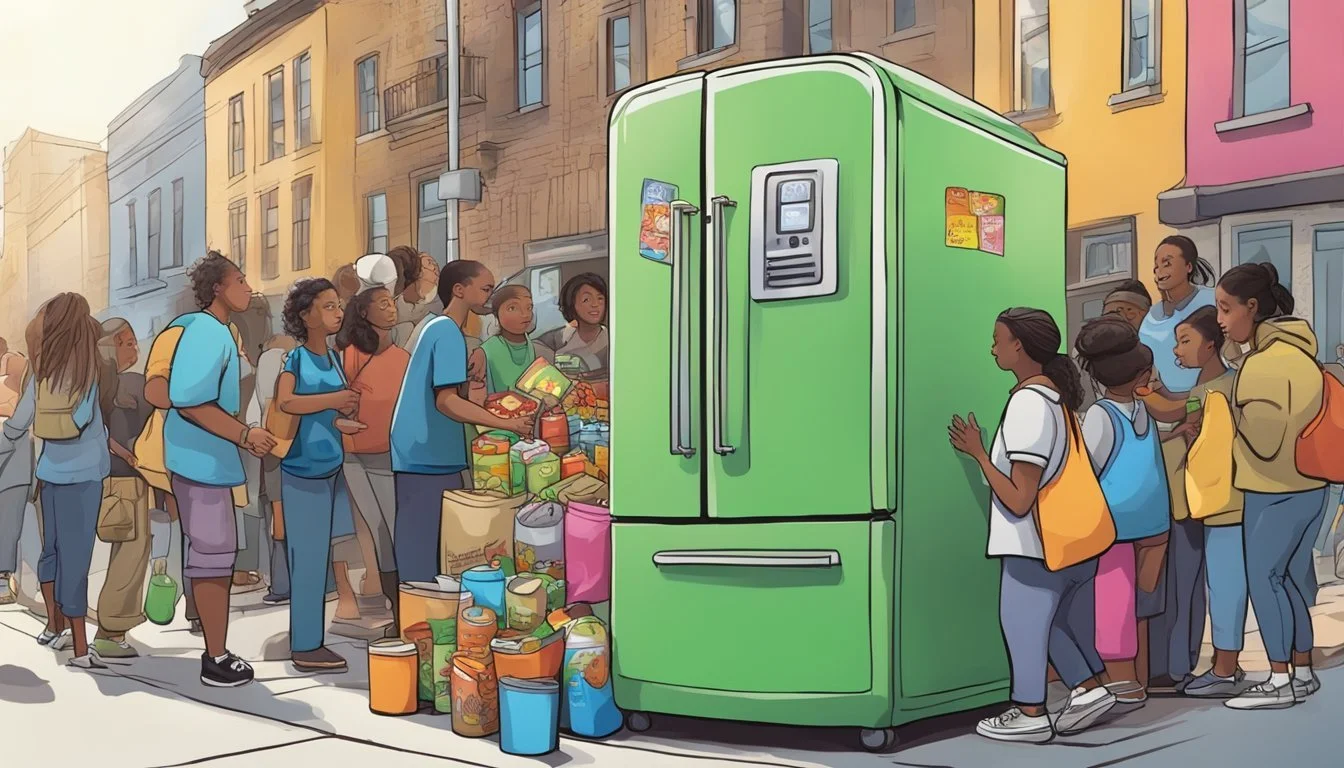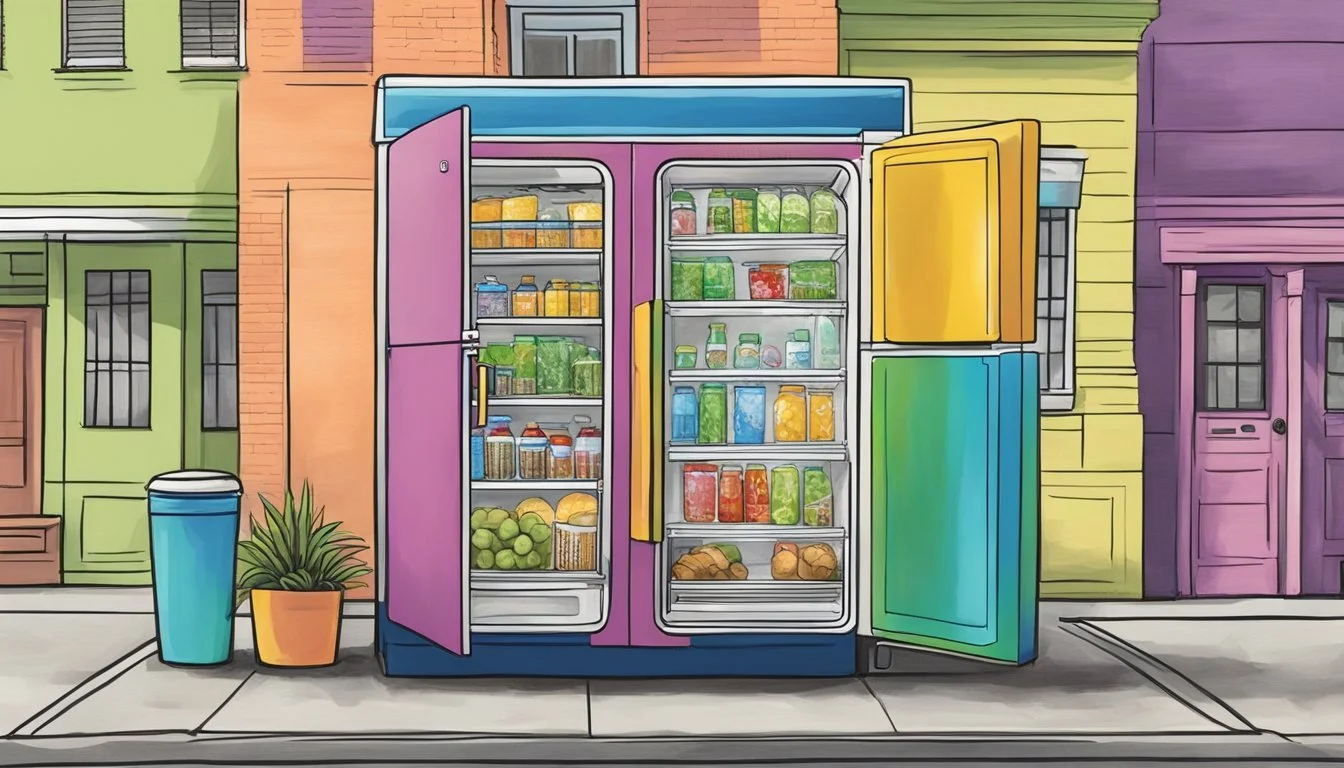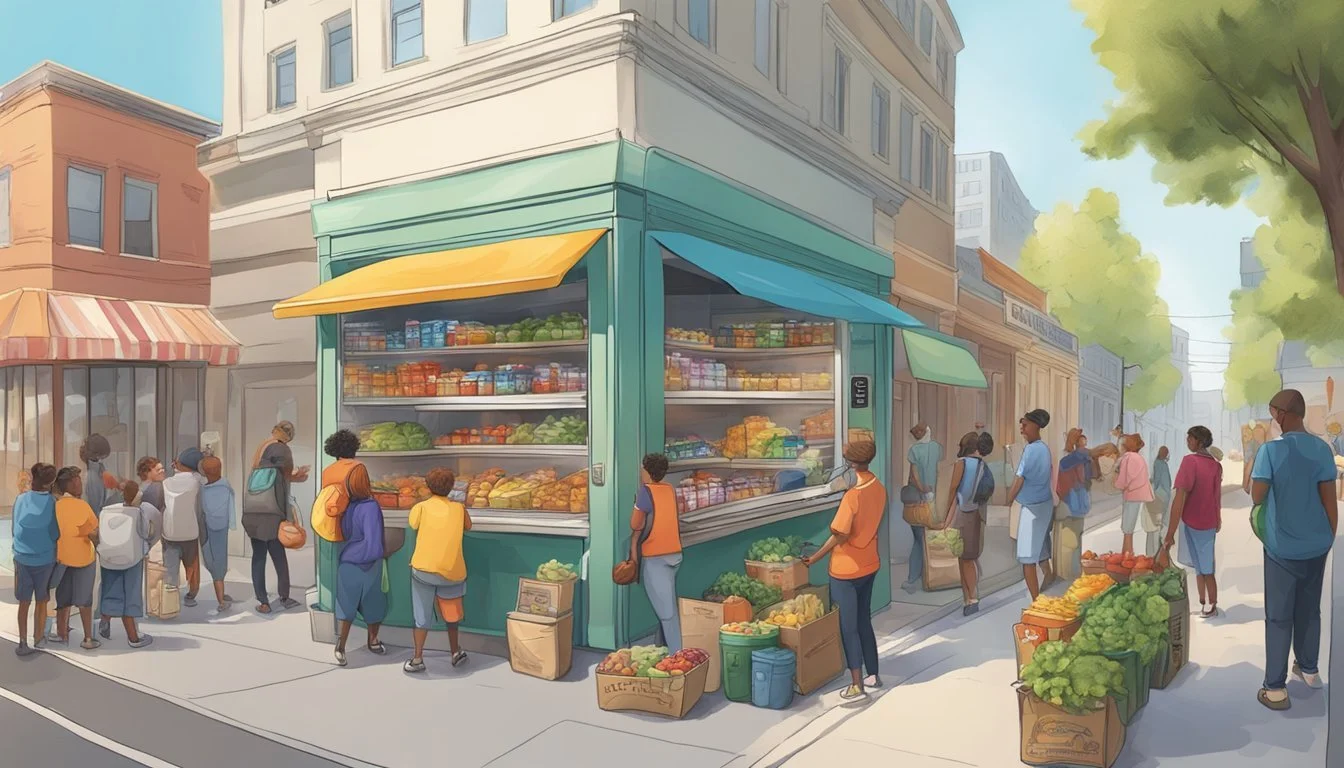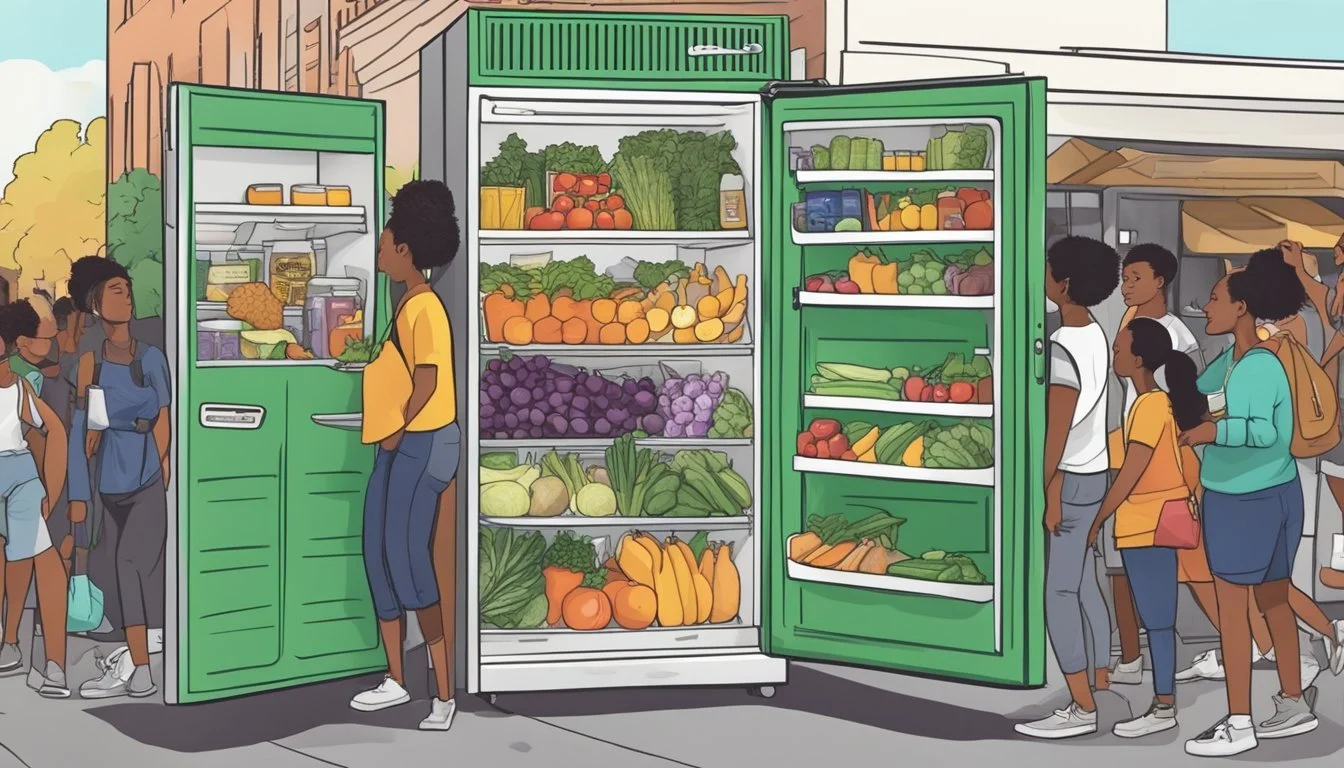New Orleans, LA Community Fridge
A Fresh Take on Fighting Food Insecurity
New Orleans, Louisiana, has embraced the community fridge movement with the introduction of the New Orleans Community Fridges (NOCF) initiative. This innovative approach to combat food insecurity invites residents and businesses to share surplus food and make essential items accessible to those in need. Strategically placed throughout the city, these refrigerators are more than just food storage units; they are symbols of mutual aid and community spirit, allowing anyone to take what they need or leave what they can.
The NOCF network operates on a simple yet impactful premise: Food for All. By ensuring that fresh and nutritious food is available and free for everyone, the program aims to address the food deserts in New Orleans. The inspiration for the community fridge concept in New Orleans comes from successful models in cities like New York and Los Angeles, which have shown how localized food support can strengthen the bonds within a community.
These fridges not only provide sustenance, but they also foster a sense of ownership and responsibility among locals. Individuals are encouraged to participate through various roles, from stocking and maintaining the fridges to spreading the word. The success of New Orleans Community Fridges hinges on active community participation, making it a grassroots solution to a global problem.
Concept of Community Fridges
Community fridges in New Orleans offer an innovative solution to food insecurity through a system of mutual aid and solidarity. These public refrigerators are accessible to all, aiming to alleviate hunger by sharing resources within the community.
Background
The concept of community fridges started as a grassroots response to the growing need for food resources, particularly exacerbated during the pandemic in 2020. In New Orleans, these fridges represent a nexus where excess food can be shared, reducing waste and addressing hunger simultaneously.
Principles of Operation
Community fridges operate under principles of mutual aid and solidarity, with the simple rule: take what you need, leave what you can. They are stocked with a variety of food items, including:
Fresh produce
Pantry items
Bottled water
Canned goods
Prepared meals
Volunteers maintain the fridges, and donations come from community members, local businesses, and organizations committed to fighting food insecurity.
Community Impact
The presence of community fridges has a direct impact on local neighborhoods by providing immediate relief to those facing hunger. These fridges not only supply food but also foster a sense of community, as they often become hubs for sharing and caring, strengthening community bonds.
Challenges Faced
Despite the benefits, community fridges face challenges such as maintaining consistent food supplies, ensuring food safety, and securing ongoing community and financial support to sustain operations. Vandalism and regulatory hurdles also pose difficulties that require continuous community engagement to overcome.
The New Orleans Community Fridge Network
The New Orleans Community Fridge Network is a grassroots initiative aimed at addressing food insecurity through a network of publicly accessible refrigerators. These fridges serve as a resource for those in need, sustained by the contributions and goodwill of local volunteers.
History and Development
The concept of community fridges began in response to the urgent need to combat food insecurity in New Orleans. Volunteers and community organizers established the New Orleans Community Fridge Network with a mission to facilitate free access to food. The initiative quickly spread, with refrigerators being placed in accessible locations across the city, from Westwego to the Lower Ninth Ward.
Goals and Achievements
Goals:
To empower local communities by offering immediate access to free food.
To encourage mutual aid and sustainable community engagement.
Achievements:
Deployment of over 20 community fridges throughout New Orleans.
Community garden partnerships to supply fresh produce.
Creation of an information distribution hub via their website, serving both volunteers and beneficiaries.
The New Orleans Community Fridge Network continues to foster community solidarity, with every fridge symbolizing their commitment to alleviating hunger and promoting food sovereignty.
Locations and Accessibility
New Orleans Community Fridges offer accessible food resources across a variety of locations in New Orleans.
Mapping Fridge Sites
New Orleans Community Fridges (NOCF) are strategically located to serve communities in need of food resources. Key sites include:
Trinity Community Center: An established access point for community support.
Local Artist Contributions: Artists contribute by beautifying fridge locations, making them not only points of aid but also of community pride.
Fridges can be found at the following addresses:
1609 Delery St.
1801 Alvar St.
1941 Marigny St. (at Johnson)
Other locations spanning from Westwego to the Lower Ninth Ward.
The above listing is not exhaustive and new locations are continuously being added.
Partners and Sponsors
Community support is essential for the sustainability of the NOCF initiative. Local businesses, organizations, and individuals offer support through donations and partnerships, fostering a network of aid and involving diverse members of the community.
Donation Guide
The New Orleans Community Fridge initiative thrives on the collective efforts of the community. Donation guidelines ensure that the process is both effective and safe for everyone involved.
What to Donate
Donors are encouraged to contribute a variety of items to the community fridges. Suitable donations include:
Fresh Produce: Fruits and vegetables that are clean and ready to eat.
Cooked Meals: (how long do cooked meals last?) Home-cooked meals should be labeled with ingredients and the date prepared.
Canned Goods: Unexpired and unopened canned foods.
Water: Bottled water is always needed, especially during hot weather or emergencies.
Pantry Items: Non-perishable foods like rice, pasta, and cereals.
It operates on an honor system, so it's important that all food is safe for consumption and within its best by date.
How to Donate
To make a donation:
Find a local community fridge location.
Ensure that the items are within the accepted categories and not near expiration.
Place items in the designated areas inside the fridge or pantry shelves.
Donations can be made at any time, and every contribution, large or small, supports the initiative's goal of providing free food to those in need.
Safety and Maintenance
Maintaining the safety and upkeep of the community fridges is paramount. Donors play a significant role by:
Making sure that donated items are properly sealed and undamaged.
Wiping down any containers or surfaces if spills occur.
Not leaving items outside the fridge as this can attract pests and spoil the food.
All donated items undergo routine checks to ensure the integrity of the community fridges and the well-being of the individuals they serve.
Collaborations and Community Involvement
The New Orleans Community Fridges operates on a model of cooperative engagement and serves as a beacon of mutual aid. This initiative not only connects resources to needs but also acts as a canvas for local creativity and a platform for collective volunteer work.
Partner Organizations
New Orleans Community Fridges (NOCF) has thrived through partnerships with various local entities. These organizations play crucial roles, ranging from providing locations to host the fridges, to offering vital logistical support. It is their commitment and collective effort that sustain each fridge.
Local Artist Contributions
Artists in New Orleans lend their creativity to the Community Fridge initiative by decorating the fridges, making them not only functional but also a vibrant part of the neighborhoods they serve. This artistic involvement also helps in raising awareness and celebrating community unity.
Community Volunteering
Volunteers are the backbone of NOCF, handling everything from maintenance to stocking the fridges with food. Individuals are empowered to treat the fridges as their own, fostering a sense of ownership and respect for these shared community resources. Volunteers include fridge keepers, visitors, and those contributing food or funds.
How to Support
Supporting the New Orleans Community Fridge initiative can be done through various means to ensure the program continues to offer resources to those in need. Individuals and organizations can contribute financially, provide physical contributions, or assist in promotion and awareness efforts.
Financial Contributions
GoFundMe and Venmo: Monetary donations fuel the initiative's operations, from buying fridges to covering repair costs and electricity bills. Supporters can make direct financial contributions through GoFundMe campaigns or Venmo payments, which offer a quick and secure way to donate.
GoFundMe: Search for active campaigns tied to the New Orleans Community Fridge.
Venmo: Send donations directly to the initiative's Venmo handle.
Physical Contributions
Donating Food and Supplies: Kindness and charity are manifested when individuals donate fresh produce, pantry items, bottled water, and other essentials to the community fridges.
What to Donate: Fresh produce, pantry items, bottled water, canned goods, and prepared meals.
Where to Donate: Drop off contributions at any of the fridge locations around New Orleans.
Promotion and Awareness
Instagram and Word of Mouth: Raising awareness is key to the initiative's success. Sharing information via Instagram, engaging in community discussions, and encouraging others to support can amplify the impact.
Instagram: Follow and share the Community Fridge's Instagram page to stay updated and spread the word.
Community Engagement: Talk about the program within your social circles to encourage more contributions.
Impact of the Pandemic
During the pandemic, food scarcity became a pressing issue in New Orleans. Community fridges emerged as a tangible collective effort to address the need for accessible food.
Food Scarcity
The pandemic heightened the existing food insecurity issues in New Orleans. Food scarcity escalated as the economic fallout affected employment and incomes, making the availability of food a significant concern for many residents.
Community Response
In response to growing food scarcity, community members rallied together to establish community fridges throughout the city. These fridges were regularly stocked with frozen meals, fresh produce, and cold water, accessible to anyone in need, exemplifying a collective effort to mitigate hunger.
Sustainability and Future
The sustainability of community fridges hinges on continuous operating costs, such as electricity and maintenance, which are supported by volunteers and donations. The future of these fridges relies on ongoing community engagement and support to remain a reliable resource for those facing food scarcity.
Educational Efforts
The New Orleans Community Fridge initiative not only combats food insecurity but also educates the public. Its educational efforts aim to raise awareness and teach sustainable practices surrounding food.
Workshops and Events
The program organizes workshops and events designed to educate individuals on the importance of food donation, reducing food waste, and community solidarity. These events serve as resources for learning how to properly stock and maintain community fridges.
Social Media Outreach
Through Instagram and other social media platforms, New Orleans Community Fridge conducts outreach that's both informative and engaging. They share updates about the community fridge locations, food safety guidelines, and how to contribute. This not only informs the community but also builds a network of support for ongoing sustenance.
Fridge Management
Managing a community fridge in New Orleans involves a careful consideration of operating costs and available hours to ensure the initiative is both sustainable and accessible.
Operating Costs
The operating costs for New Orleans Community Fridges include a variety of expenses such as:
Fridge purchases and repairs: Ensuring the fridges are in working order.
Powering and sheltering: Expenses for electricity and protective shelters for the fridges.
Artist compensation: Payments to local BIPOC artists who contribute to the project.
Food replenishment: Costs associated with restocking the fridges with fresh produce and other food items.
Hours of Operation
Each community fridge location in New Orleans operates under specific hours of operation that can vary. However, some commonalities include:
Open daily: Most fridges are accessible every day, providing ongoing resources.
Daylight accessibility: Several fridges are primarily accessible during daylight to ensure user safety and food freshness.
Operation hours can be subject to change, and users are typically advised to check for the most up-to-date information regarding a specific fridge's availability.
Future Directions
The evolution of New Orleans Community Fridges relies on strategic expansion and influencing policies to support community-led food security initiatives.
Expansion Plans
The network of New Orleans Community Fridges plans to increase its footprint across the city. As they target new neighborhoods, their objective is to ensure that access to basic nutrition is a reality for all community members, particularly in food deserts. The current focus is on establishing partnerships, securing funding for fridge purchases, and handling maintenance to boost the number of operational fridges.
Key expansion strategies include:
Identifying high-need areas through community feedback
Partnering with local businesses and organizations for physical space and resources
Ensuring sustainability through volunteer recruitment and public donations
Policy Advocacy
New Orleans Community Fridges not only provides free food access but also engages in policy advocacy to sustain and grow the community fridge network. They campaign for policies that would ease city regulations around public food sharing, allowing the initiative to operate more freely.
To advance these goals, they prioritize:
Building relationships with lawmakers and community leaders
Educating the public on food insecurity issues
Creating proposals that demonstrate the positive impact of community fridges on local communities.

